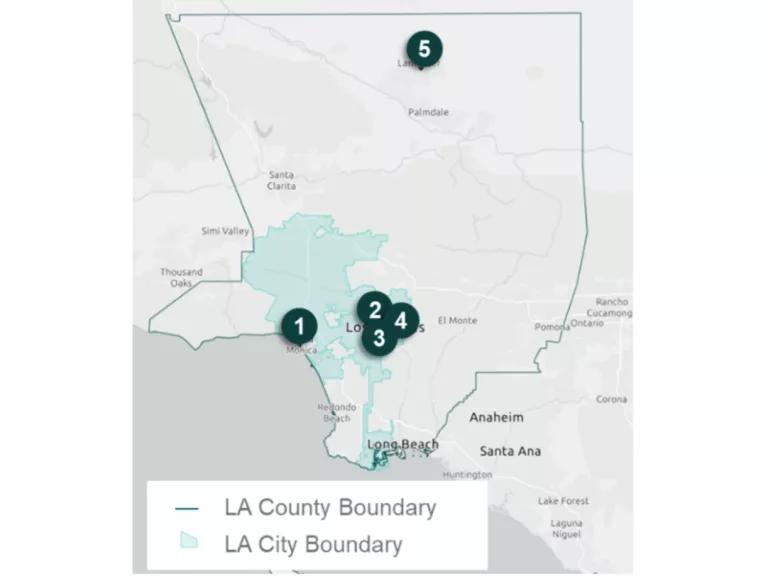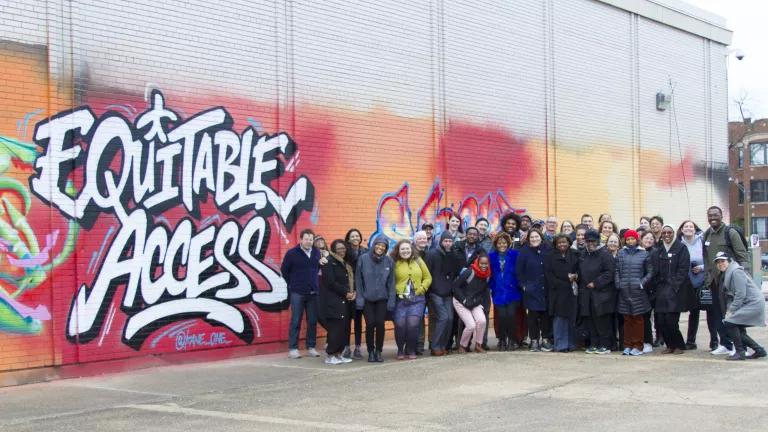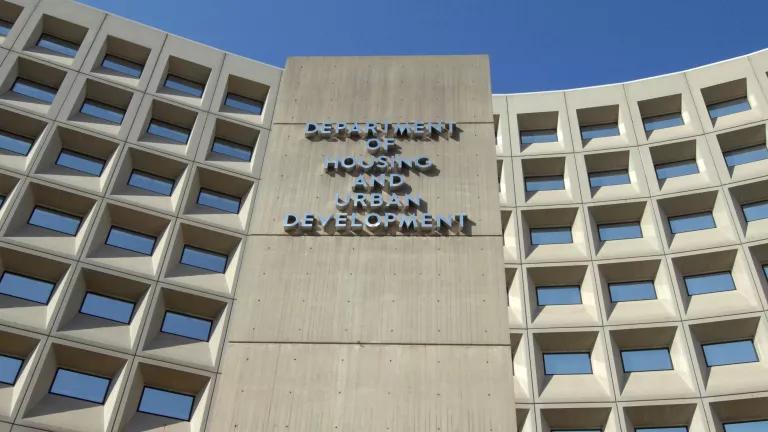Overcoming Decarbonization Barriers in Los Angeles’s Affordable Housing
Affordable housing is among the most vulnerable and underfunded of building sectors but thoughtful design and flexible financing could help provide cleaner, healthier buildings for all.

Los Angeles, California
Alamy
The pressing need to reduce carbon emissions from buildings presents both a significant disruption and a unique opportunity for the affordable housing sector. With thoughtful design and flexible financing, there's potential to provide tenants with cleaner, healthier buildings, and more climate-ready infrastructure, while also building the market for zero-carbon technologies for all. However, affordable housing is already one of the most vulnerable and underfunded building sectors, making energy retrofits and resilience an even greater challenge.
To better understand the barriers limiting the decarbonization of affordable housing beyond what energy and cost analyses could provide, NRDC commissioned an Arup-authored study of energy retrofits of affordable multi-family housing buildings within the Los Angeles metropolitan area. The study specifically examined real-world examples to expose obstacles, inefficiencies, and opportunities encountered during retrofit processes.

A map of Los Angeles, California
The study was guided by an advisory committee convened by NRDC that brought diverse knowledge and experience across affordable housing, including Association for Energy Affordability, Enterprise Community Partners, Housing Partnership Network, LeSar Development Consultants, Los Angeles Alliance for a New Economy, Stewards of Affordable Housing for the Future, Strategic Actions for a Just Economy, and Strategic Concepts in Organizing and Policy Education. The advisory committee and study team identified five case study projects in affordable multifamily housing buildings that had recently completed decarbonization-related retrofits and collectively represented diverse ownership. Subsequently, the study team conducted interviews with the building owners, operators, contractors, and tenants.
Six key challenge areas emerged that must be addressed to enable decarbonization of affordable housing at scale: carbon reduction strategies, financing, implementation, policy, technical expertise, and tenant impact. They are examined in this report.
The funding conundrum
The study revealed that the way financing programs are structured often requires navigating unwieldy administrative processes. Affordable housing providers generally have to assemble capital from multiple sources, layering funding from federal, state, and local programs as well as private philanthropy and impact investors, with each source having its own rules, requirements, and schedules.
At the same time, the landscape of programs available to fund or finance energy retrofits is complex and decentralized, making it difficult for housing providers to identify, access, and effectively utilize funding resources. Additionally, the delivery of grants or funds often doesn’t align with the timing of the project's need for capital, with grant approvals sometimes taking up to two years.
For one project, funding delays were so significant that by the time the project was completed, new, better, and cheaper solutions were already on the market. In another, the local utility was delayed in reflecting bill credits from the installed rooftop solar photovoltaics, thwarting the housing operators’ permanent loan underwriting process.
Given the historical underfunding of low-income housing, major safety issues often accumulate that must be funded and addressed before any energy retrofit programs can occur. Many case studies demonstrated this problem, demanding a new project scope and creating implementation bottlenecks. One project unexpectedly had to divert 40 percent of its total project budget toward asbestos abatement. However, some project funds don’t allow for redirecting funds, creating roadblocks when the scope of work necessarily changed.
Designing effective programs
The report noted that project teams are doing their best to stack grants and incentives. But the report also acknowledged that this approach comes with major challenges for providers, who often lack the capacity or technical knowledge to identify and apply for appropriate grants. So, while programs such as the Inflation Reduction Act (IRA) provide significant funding for decarbonization, each IRA program has its unique eligibility criteria and requirements, and the sector lacks the corresponding technical assistance to effectively access funding.
The study concluded with recommended advocacy pathways for policymakers to help overcome these issues. This way, policymakers can better respond to the real-time experiences of affordable housing providers and, subsequently, design programs that more effectively deliver equitable decarbonization. For example, the study recommends expediting financing and permitting processes and implementing mechanisms for revising and improving long-term strategic planning and programs.
Currently, the heavy burden of retrofits is falling on housing providers who have limited capacity and are unable to fully dedicate their efforts to realizing equitable decarbonization. In the future, better support for housing providers, including technical assistance, will be essential to achieving this critical outcome. Not least, tenants will benefit from cleaner buildings, improved indoor air quality, and lower utility costs, demonstrating that these changes are worthwhile for all.
Arup author biographies
Maggie Messerschmidt is a senior resilience consultant at Arup, whose work focuses on the design and implementation of equitable, sustainable, and adaptive futures. Her skills include participatory strategic planning, systems thinking, and applying environmental science to policy and implementation. She manages a broad range of projects to assess and mitigate climate impacts. She has extensive experience in developing resilient solutions in the built environment to address extreme heat, flooding, and water supply issues.
Brittany Moffett is a senior resilience engineer based in Arup's Los Angeles office. Her work is a blend of on-the-ground insight—implementing resilience projects—and broader analyses that help inform policy and program design. Moffett’s projects span scales, from unearthing decarbonizing challenges faced by the affordable housing sector to providing technical energy support to individual trusted community resources and transforming them into resilience hubs.
Geffen Oren is a senior sustainability consultant in Arup’s Los Angeles office. Oren has overseen the integration of sustainability strategies into building scale and masterplan projects. His experience includes performing and managing environmental design, energy analysis, daylight analysis, water conservation studies, and LEED and other sustainability benchmarking systems on project types ranging from laboratory to class A office space and affordable housing. Oren has published a paper on using ASHRAE 90.1-2016 for code compliance and co-taught the introductory sustainable design course Environmental Technology at the New School in New York City in 2019.
Heather Rosenberg is an associate principal and Arup’s Americas resilience discipline leader. An ecologist by training, she brings more than 20 years of experience in leading sustainability and resilience projects across the built environment. Her systemic approach integrates interdisciplinary teams to align technical expertise with stakeholder engagement and a commitment to social equity. Her current work focuses on decarbonization and energy transition through a resilience lens.



